英语专题复习——情态动词will的用法归纳
will的用法总结大全

will的用法总结大全will的用法你知道多少,今天给大家带来will的用法,希望能够帮助到大家,下面就和大家分享,来欣赏一下吧。
will的用法总结大全will的意思n. 愿意,意志(力),[法]遗嘱vt. 决心要,将(财产等)遗赠某人,用意志力驱使(某事发生)vi. 愿意,希望,想要aux. 将,将会,会,要变形:过去式: willed; 现在分词:willing; 过去分词:willed;will用法will可以用作助动词will用作助动词时主要用于构成将来式,在美式英语中各个人称均可用will构成将来式,而在英式英语中则多用于第二、第三人称。
在英式英语中当主语是“第二〔第三〕人称+I〔we〕”时也多使用will。
will还可用作情态动词:①用于第一人称时表示说话人(即主语)的意志,含有“愿意”“许诺”“意向”或“决定”等意义。
②用于第二、第三人称,表示说话人或主语的意志,含意是“愿意”“命令”“决定”“有礼貌的请求”等。
但只有指现在的意志时才明确,指将来的意志时就与将来式混淆了,如果句子带有将来时间状语,表示意志的作用往往会消失。
③用于第二、第三人称时还可表示或然性、似真性或揣测,后接动词不定式的一般式,指对现在或将来的揣测(但只有明确表示关于现在的揣测时,才算是情态动词,否则应算是将来式); 后接动词不定式的完成式,指对过去的揣测。
④用于主语指非生物的第三人称,表示具有某种能力,能胜任一件事情。
⑤表示坚持、固执或顽强的决心时可用于各种人称,重读,肯定式不用缩写形式,但否定式则可用wont; 表示经常性、习惯性、倾向性、不可避免性时不重读,多用于第三人称。
⑥表示普遍真理或事物的自然属性。
⑦用于条件状语从句中表示主语或说话人的意志。
will用作动词的基本意思是“用意志力驱使(某事发生)”,可接名词、代词作宾语,也可接以动词不定式充当补足语的复合宾语。
will用作助动词的用法例句I will do my best.我将会尽力而为。
英语专题复习——情态动词will的用法归纳
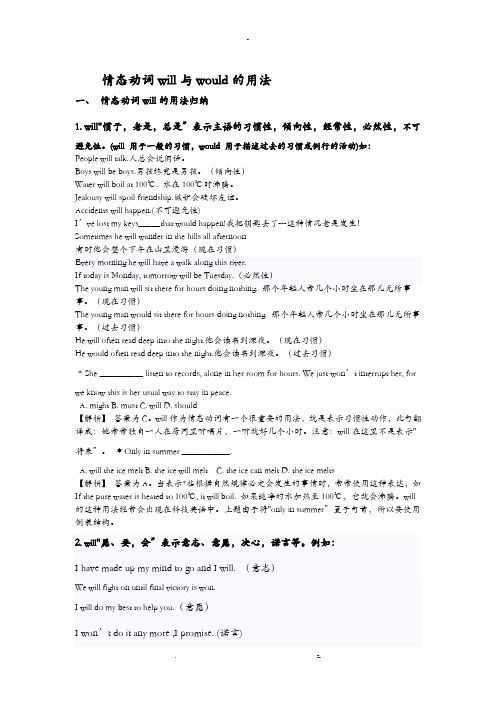
情态动词will与would的用法一、情态动词will的用法归纳1. will"惯于,老是,总是”表示主语的习惯性,倾向性,经常性,必然性,不可避免性。
(will 用于一般的习惯,would 用于描述过去的习惯或例行的活动)如:People will talk.人总会说闲话。
Boys will be boys.男孩终究是男孩。
(倾向性)Water will boil at 100℃. 水在100℃时沸腾。
Jealousy will spoil friendship.嫉妒会破坏友谊。
Accidents will happen.(不可避免性)I’ve lost my keys_____that would happen!我把钥匙丢了---这种情况老是发生!Sometimes he will wander in the hills all afternoon有时他会整个下午在山里漫游(现在习惯)Every morning he will have a walk along this river.If today is Monday, tomorrow will be Tuesday.(必然性)The young man will sit there for hours doing nothing. 那个年轻人常几个小时坐在那儿无所事事。
(现在习惯)The young man would sit there for hours doing nothing. 那个年轻人常几个小时坐在那儿无所事事。
(过去习惯)He will often read deep into the night.他会读书到深夜。
(现在习惯)He would often read deep into the night.他会读书到深夜。
(过去习惯)﹡She __________ listen to records, alone in her room for hours. We just won’t interrupt her, for we know this is her usual way to stay in peace.A. mightB. mustC. willD. should【解析】答案为C。
情态助动车will表要求用法
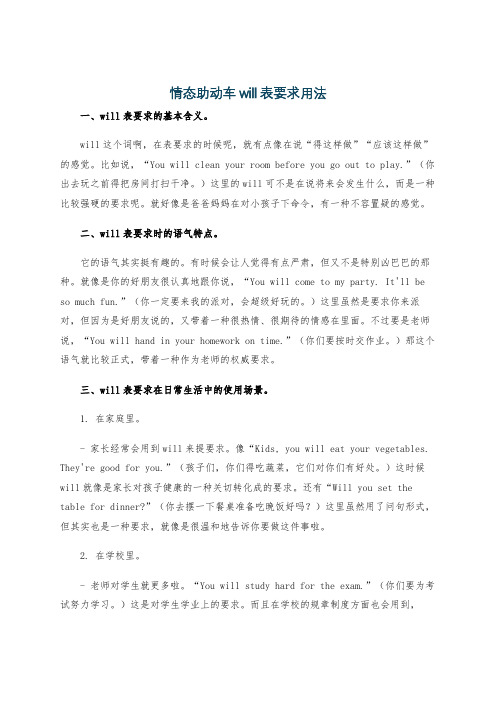
情态助动车will表要求用法一、will表要求的基本含义。
will这个词啊,在表要求的时候呢,就有点像在说“得这样做”“应该这样做”的感觉。
比如说,“You will clean your room before you go out to play.”(你出去玩之前得把房间打扫干净。
)这里的will可不是在说将来会发生什么,而是一种比较强硬的要求呢。
就好像是爸爸妈妈在对小孩子下命令,有一种不容置疑的感觉。
二、will表要求时的语气特点。
它的语气其实挺有趣的。
有时候会让人觉得有点严肃,但又不是特别凶巴巴的那种。
就像是你的好朋友很认真地跟你说,“You will come to my party. It'll be so much fun.”(你一定要来我的派对,会超级好玩的。
)这里虽然是要求你来派对,但因为是好朋友说的,又带着一种很热情、很期待的情感在里面。
不过要是老师说,“You will hand in your homework on time.”(你们要按时交作业。
)那这个语气就比较正式,带着一种作为老师的权威要求。
三、will表要求在日常生活中的使用场景。
1. 在家庭里。
- 家长经常会用到will来提要求。
像“Kids, you will eat your vegetables. They're good for you.”(孩子们,你们得吃蔬菜,它们对你们有好处。
)这时候will就像是家长对孩子健康的一种关切转化成的要求。
还有“Will you set the table for dinner?”(你去摆一下餐桌准备吃晚饭好吗?)这里虽然用了问句形式,但其实也是一种要求,就像是很温和地告诉你要做这件事啦。
2. 在学校里。
- 老师对学生就更多啦。
“You will study hard for the exam.”(你们要为考试努力学习。
)这是对学生学业上的要求。
而且在学校的规章制度方面也会用到,“Students will follow the school rules.”(学生们要遵守学校的规章制度。
will的用法总结

will的用法总结Will作为一个情态动词,在英语中有多种用法。
下面将对Will的用法进行总结和解释,并提供相关例句,希望能够帮助你更好地理解和掌握它的用法。
1. 表示将来的意愿或打算:- I will go to the party tomorrow.(我明天会去参加派对。
)- She will visit her grandparents next week.(她下周会去看望她的祖父母。
)2. 表示客观判断或预测:- It will rain tomorrow.(明天会下雨。
)- I think he will become a successful businessman.(我认为他会成为一个成功的商人。
)3. 表示能力或技能:- She will swim across the river.(她能够游过河去。
)- He will solve the math problem easily.(他可以轻松解决这个数学问题。
)4. 表示坚决的意志或要求:- You will apologize to her right now!(你必须立刻向她道歉!)- I will not tolerate such behavior.(我绝对不会容忍这样的行为。
)5. 表示习惯性的行为:- He will always arrive late for meetings.(他开会总是迟到。
)- She will often forget her keys at home.(她经常会忘记把钥匙带在家里。
)6. 表示请求或征求意见:- Will you pass me the salt, please?(请把盐递给我好吗?)- Will you help me with this task?(你能帮我完成这个任务吗?)7. 与动词原形连用表示将来进行时:- I will be studying English tomorrow evening.(明天晚上我将会在学英语。
will的用法总结

will的用法总结一、will的基本概念will是英语中最常用的情态动词之一,表示未来时态、意愿、决心和推测等含义。
它的基本形式是will,否定形式为won't,缩写形式为' ll。
二、will的未来时态用法1. 表示将要发生的事情。
例如:I will go to the cinema tomorrow.2. 表示预测或推测将要发生的事情。
例如:It will rain tomorrow.3. 表示意愿或请求。
例如:Will you help me with my homework?4. 表示承诺或威胁。
例如:I will never do it again.三、will的意愿用法1. 表示对未来的期望或希望。
例如:I hope you will come to my party.2. 表示建议或提议。
例如:You will feel better if you take a rest.3. 表示允诺或拒绝请求。
例如:I will lend you some money.四、will的决心用法1. 表示坚定不移的决心。
例如:I will finish this project no matter what happens.2. 表示强烈要求或命令。
例如:You will do as I say.五、will的推测用法1. 表示对现在或过去发生事情的猜测。
例如:He will be late for the meeting.2. 表示对过去发生事情的推测。
例如:He will have arrived in London by now.六、will的注意事项1. 不要把will和shall混淆,shall表示建议或提议。
2. 不要在if从句中使用will,应该用would。
3. 在口语中,will常被缩写为' ll。
七、will的练习题1. 用will填空:a) I _______ be there on time.b) She _______ not come to the party.c) Will you _______ help me with my homework?d) He _______ never forget this experience.2. 改错:a) I will call you when I will arrive.b) If it will rain, we will stay at home.c) He will have finished his work by now.答案:1. a) will; b) will not; c) help; d) will2. a) I will call you when I arrive.b) If it rains, we will stay at home.c) He should have finished his work by now.。
will的用法
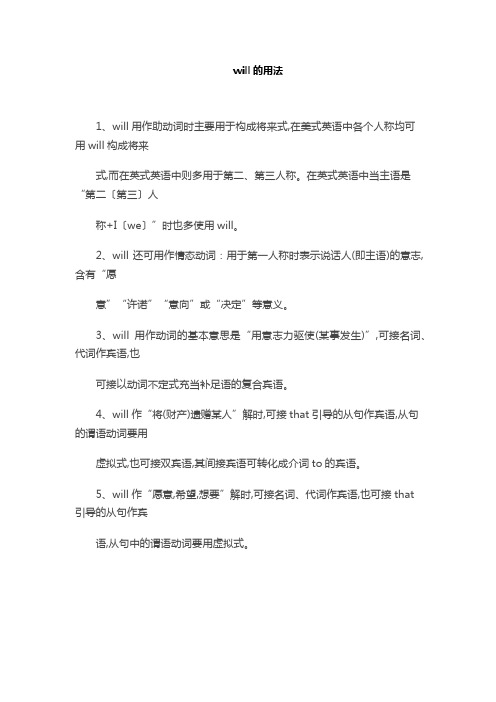
will的用法
1、will用作助动词时主要用于构成将来式,在美式英语中各个人称均可
用will构成将来
式,而在英式英语中则多用于第二、第三人称。
在英式英语中当主语是“第二〔第三〕人
称+I〔we〕”时也多使用will。
2、will还可用作情态动词:用于第一人称时表示说话人(即主语)的意志,含有“愿
意”“许诺”“意向”或“决定”等意义。
3、will用作动词的基本意思是“用意志力驱使(某事发生)”,可接名词、代词作宾语,也
可接以动词不定式充当补足语的复合宾语。
4、will作“将(财产)遗赠某人”解时,可接that引导的从句作宾语,从句的谓语动词要用
虚拟式,也可接双宾语,其间接宾语可转化成介词to的宾语。
5、will作“愿意,希望,想要”解时,可接名词、代词作宾语,也可接that
引导的从句作宾
语,从句中的谓语动词要用虚拟式。
will的用法总结
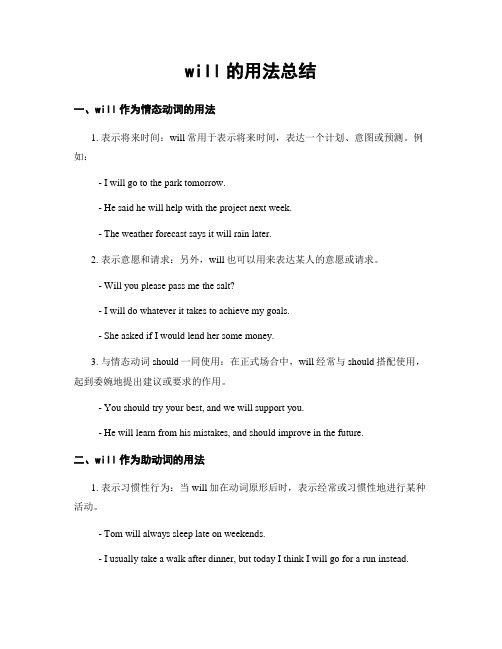
will的用法总结一、will作为情态动词的用法1. 表示将来时间:will常用于表示将来时间,表达一个计划、意图或预测。
例如:- I will go to the park tomorrow.- He said he will help with the project next week.- The weather forecast says it will rain later.2. 表示意愿和请求:另外,will也可以用来表达某人的意愿或请求。
- Will you please pass me the salt?- I will do whatever it takes to achieve my goals.- She asked if I would lend her some money.3. 与情态动词should一同使用:在正式场合中,will经常与should搭配使用,起到委婉地提出建议或要求的作用。
- You should try your best, and we will support you.- He will learn from his mistakes, and should improve in the future.二、will作为助动词的用法1. 表示习惯性行为:当will加在动词原形后时,表示经常或习惯性地进行某种活动。
- Tom will always sleep late on weekends.- I usually take a walk after dinner, but today I think I will go for a run instead.2. 表示意愿和决心:当will加在be动词后面时,表达一个坚定的意愿、决心或反对。
- She is determined that she will succeed no matter what.- They are willing to make sacrifices for the greater good.- I won’t let fear hold me back from pursuing my dreams.三、常见的固定搭配1. willpower(意志力): 意志坚定努力去完成某项任务时用到。
will的用法总结
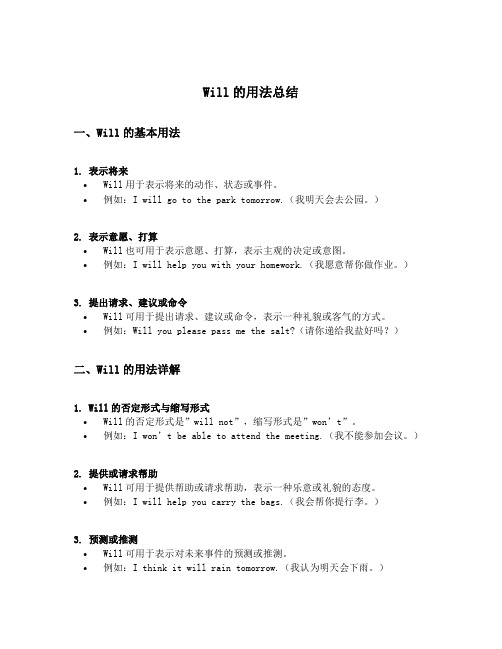
Will的用法总结一、Will的基本用法1. 表示将来•Will用于表示将来的动作、状态或事件。
•例如:I will go to the park tomorrow.(我明天会去公园。
)2. 表示意愿、打算•Will也可用于表示意愿、打算,表示主观的决定或意图。
•例如:I will help you with your homework.(我愿意帮你做作业。
)3. 提出请求、建议或命令•Will可用于提出请求、建议或命令,表示一种礼貌或客气的方式。
•例如:Will you please pass me the salt?(请你递给我盐好吗?)二、Will的用法详解1. Will的否定形式与缩写形式•Will的否定形式是”will not”,缩写形式是”won’t”。
•例如:I won’t be able to attend the meeting.(我不能参加会议。
)2. 提供或请求帮助•Will可用于提供帮助或请求帮助,表示一种乐意或礼貌的态度。
•例如:I will help you carry the bags.(我会帮你提行李。
)3. 预测或推测•Will可用于表示对未来事件的预测或推测。
•例如:I think it will rain tomorrow.(我认为明天会下雨。
)三、Will与其他表示将来的词汇的比较1. Will与be going to的区别•Will表示主观的意愿或决定,而be going to表示计划、打算或意图。
•例如:I will study for the exam.(我准备好好复习考试。
)•例如:I am going to visit my grandparents.(我打算去拜访我的祖父母。
)2. Will与shall的区别•Will与shall在表示将来时的用法上没有实质性的区别。
Shall在现代英语中已经不常用。
•例如:I will call you later.(我稍后会给你打电话。
will的用法总结归纳

will的用法总结归纳一、"Will"的基本用法1. "Will"作为情态助动词在英语中,"will"常用作情态助动词,表示将来时态、意愿或推测。
它可以用于肯定句、否定句和疑问句中。
a) 表示将来时态:例如:"I will go to the party tomorrow."(明天我将去参加派对。
)b) 表示意愿或承诺:例如:"I will help you with your homework."(我会帮你写完成作业。
)c) 表示推测或预测:例如:"It will rain later."(过会儿会下雨。
)2. "Will"表示未来计划在表达未来的计划或安排时,我们经常使用"will"。
例如:a) "I will call you later."(我一会儿给你打电话。
)b) "We will have a meeting next week."(我们下周开会。
)此外,也可以使用简化形式,如"I'll call you later."3. "Will not"缩写为"won't"当否定一个行为或状态时,可使用缩写形式“won't”。
例如:a) "She won't come to the movie tonight."(她今晚不会来看电影了。
)b) "They won't accept the offer."(他们不会接受这个提议。
)二、其他用法总结归纳1. 用于表示习惯或常态一些动词可以用"will"来表示习惯、重复的动作或普遍真理。
例如:a) "She will usually take a walk after dinner."(她通常会在晚饭后散步。
will的用法总结归纳

will的用法总结归纳Will的用法总结归纳Will是英语中最常用的情态动词之一,表示将要或愿意做某事。
它在英语中的使用非常广泛,可以用于各种语境,包括未来时态、条件句、请求和建议等。
本文将从以下几个方面详细介绍Will的用法。
一、表示未来时态1. Will + 动词原形Will可以用来表示将要发生的事情,例如:I will go to the cinema tonight.(我今晚会去电影院。
)She will be here soon.(她很快就会到这里。
)2. Be going to + 动词原形除了使用Will之外,还可以使用“be going to”表达将要发生的事情,例如:I am going to visit my grandparents next week.(下周我要去看望我的祖父母。
)They are going to have a party tomorrow night.(他们明晚要开派对。
)二、表示意愿和决心1. Will + 动词原形除了表示未来时态之外,Will还可以用来表达意愿和决心,例如:I will help you with your homework.(我会帮你做作业。
)He will never give up his dream.(他永远不会放弃他的梦想。
)2. Would like + 名词/动名词/不定式“Would like”可以用来表达礼貌的请求或询问,例如:Would you like some tea?(你想要一些茶吗?)I would like to ask you a question.(我想问你一个问题。
)三、表示条件1. If + 主语 + will + 动词原形Will可以用来表示条件句中的结果,例如:If it rains tomorrow, I will stay at home.(如果明天下雨,我会待在家里。
)If he studies hard, he will pass the exam.(如果他努力学习,他会通过考试。
will情态动词用法

will情态动词用法
1. “Will 可以用来表示将来要做的事情呀!比如,I will go to the park tomorrow.(我明天会去公园。
)想想看,你是不是也经常这样说自己未来要干啥呀?”
2. “Will 还能表示意愿呢,就像‘He will help his friends.’(他愿意帮助他的朋友。
)这多好呀,体现出人与人之间互相帮助的美好意愿呀,是不是?”
3. “哎呀,当你对一件事很肯定的时候,也能用 will 呀,像‘She will pass the exam.’(她肯定会通过考试。
)这得多自信呀,就好像你坚信自己能做成某件事的时候一样!”
4. “你们想想,will 是不是有时候就像一个承诺呀?比如说‘I will keep my promise.’(我会遵守我的承诺。
)多有力量的一句话呀!”
5. “Will 还常常在问句里出现呢,像‘Will you come with me?’(你会和我一起吗?)这就好像在邀请别人加入自己,多有意思呀!”
6. “有时候,我们用 will 来表达一种决心,‘I will never give up.’(我绝不放弃。
)哇,这决心简直像钢铁一样坚定呢!”
7. “其实 will 在生活中无处不在呀,就像空气一样自然,比如说‘It will rain tomorrow.’(明天会下雨。
)你看,我们经常用它来预测未来呢,是不是很神奇呀?”
我的观点结论:will 真的是个超好用又常见的情态动词呀,在很多情况下都能帮我们准确地表达意思呢,大家可得好好掌握它呀!。
will的用法

will的用法一、Will的用法简介二、Will用于表示未来的意愿或决定1. 表达个人意愿和打算2. 询问和征求他人意见3. 提出请求或建议三、Will用于表示预测和推测1. 表达对未来的预测2. 推测现在发生的情况可能导致的结果四、Will用于做承诺和保证1. 表达确定的决心和承诺2. 针对特定事件或行为做保证五、Will与其他情态动词一起使用1. Will与can连用,表示可能性和自由选择性。
2. Will与would连用,表示礼貌地提出请求。
六、Will不能用于表达过去事件七、例句解析八、结尾总结一、Will的用法简介英语中有很多情态动词,其中will是最常见且多功能性最强大的一个。
除了常常被用来表达将要发生的事情之外,它还可以表达意愿、推测以及做出承诺。
本文将详细介绍will在不同上下文中的不同应用方式,并给出相应例句加以解析。
二、Will用于表示未来的意愿或决定1. 表达个人意愿和打算当我们想表达自己的意愿或打算时,可以使用will来表示。
例如:- I will go to the party tonight.(今晚我会去参加派对。
)- She will visit her grandmother next week.(下周她会去看望她的奶奶。
)2. 询问和征求他人意见如果我们想询问别人对某事的意见或建议,也可以使用will来提问。
例如:- Will you come with me to the cinema?(你愿意和我一起去电影院吗?)- Will it be okay if I borrow your car for a day?(如果我借用你的车一天,可以吗?)3. 提出请求或建议将will与动词原形连用,可表达请求或建议。
例如:- Will you please help me with the project?(请你帮我完成这个项目好吗?)- You should read more books. They will broaden your horizons.(你应该多读书,它们会拓宽你的视野。
情态动词will与would的用法归纳
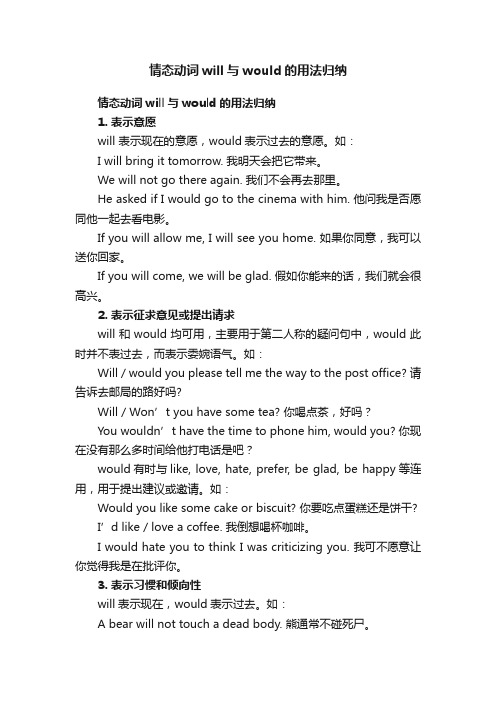
情态动词will与would的用法归纳情态动词will与would的用法归纳1. 表示意愿will 表示现在的意愿,would表示过去的意愿。
如:I will bring it tomorrow. 我明天会把它带来。
We will not go there again. 我们不会再去那里。
He asked if I would go to the cinema with him. 他问我是否愿同他一起去看电影。
If you will allow me, I will see you home. 如果你同意,我可以送你回家。
If you will come, we will be glad. 假如你能来的话,我们就会很高兴。
2. 表示征求意见或提出请求will和would均可用,主要用于第二人称的疑问句中,would此时并不表过去,而表示委婉语气。
如:Will / would you please tell me the way to the post office? 请告诉去邮局的路好吗?Will / Won’t you have some tea? 你喝点茶,好吗?You wouldn’t have the time to phone him, would you? 你现在没有那么多时间给他打电话是吧?would有时与like, love, hate, prefer, be glad, be happy等连用,用于提出建议或邀请。
如:Would you like some cake or biscuit? 你要吃点蛋糕还是饼干?I’d like / love a coffee. 我倒想喝杯咖啡。
I would hate you to think I was criticizing you. 我可不愿意让你觉得我是在批评你。
3. 表示习惯和倾向性will表示现在,would表示过去。
如:A bear will not touch a dead body. 熊通常不碰死尸。
will情态动词的用法

will情态动词的用法情态动词"will"是英语中常用的一个词,用于表达各种意愿、推测、能力、承诺等含义。
以下是"will"的主要用法:1.表示未来意愿或打算:"will" 用于表达对未来的意愿、打算或决定。
例如:I will visit my grandmother tomorrow.(我明天会去看望奶奶。
)2.表示预测和推测:"will" 用于表示根据现有情况的推测,通常用于表示不太肯定的事情。
例如:The weather looks cloudy, it will probably rain.(天气看起来多云,可能会下雨。
)3.表示能力、习惯或倾向: "will" 可以用于表示某人的能力、习惯或倾向。
例如:She will often help her friends with their problems.(她经常会帮助朋友们解决问题。
)4.用于请求、建议和命令: "will" 可以用于表示委婉的请求、建议或命令。
例如:Will you please pass the salt?(你可以帮我递一下盐吗?)5.表示承诺和意愿:"will" 用于表达某人的承诺、意愿或愿意做某事。
例如:I will help you with your project.(我会帮助你完成这个项目。
)6.在条件从句中:"will" 可以用于表示主从句之间的条件关系。
例如:If you finish your homework, I will take you to the park.(如果你完成作业,我就带你去公园。
)总之,"will"是一个多功能的情态动词,可以用于表示多种语境下的意愿、推测、能力、承诺等含义。
根据具体的语境,选择合适的用法可以准确地表达你想要表达的意思。
情态动词的will?、would、shall?、should用法
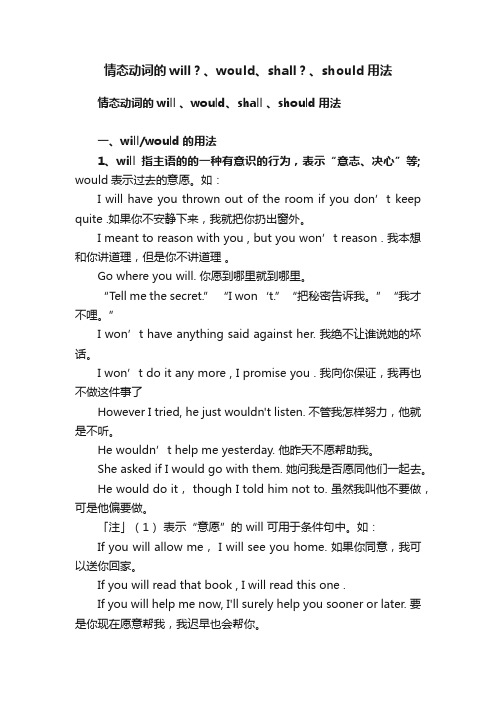
情态动词的will?、would、shall?、should用法情态动词的will、would、shall、should用法一、will/would的用法1、will指主语的的一种有意识的行为,表示“意志、决心”等; would表示过去的意愿。
如:I will have you thrown out of the room if you don’t keep quite .如果你不安静下来,我就把你扔出窗外。
I meant to reason with you , but you won’t reason . 我本想和你讲道理,但是你不讲道理。
Go where you will. 你愿到哪里就到哪里。
“Tell me the secret.” “I won‘t.”“把秘密告诉我。
”“我才不哩。
”I won’t have anything said against her. 我绝不让谁说她的坏话。
I won’t do it any more , I promise you . 我向你保证,我再也不做这件事了However I tried, he just wouldn't listen. 不管我怎样努力,他就是不听。
He wouldn’t help me yesterday. 他昨天不愿帮助我。
She asked if I would go with them. 她问我是否愿同他们一起去。
He would do it, though I told him not to. 虽然我叫他不要做,可是他偏要做。
「注」(1)表示“意愿”的 will 可用于条件句中。
如:If you will allow me, I will see you home. 如果你同意,我可以送你回家。
If you will read that book , I will read this one .If you will help me now, I'll surely help you sooner or later. 要是你现在愿意帮我,我迟早也会帮你。
will的用法和句型

will的用法和句型一、Will作为情态动词的基本用法1. 表示有意愿、意志或决心做某事;2. 表示能力或技能;3. 表示允许、请求或邀请;4. 表示预测或推测。
二、表示意愿、意志或决心做某事在这个用法中,will常常与动词原形连用,表示将来发生的事件或行为。
例句:I will go shopping tomorrow.(我明天打算去购物。
)三、表示能力或技能Will在此用法下补充了主语的能力、才智和技巧。
例句:She will finish the task in no time.(她会很快完成任务。
)四、表示允许、请求或邀请Will在这种情况下表示请求别人采取某种行动。
例句:Will you lend me your pen, please?(请你借给我你的笔好吗?)五、表示预测或推测在这个意义上,will是根据当前情况推断未来发生的事情。
例句:It's raining heavily now, so it will probably be sunny later.(现在正下着大雨,所以过会儿可能会晴天。
)六、陈述将来计划或安排例句:We will meet at 6 pm.(我们将会在下午6点见面。
)七、一般疑问句和否定句的变化在一般疑问句中,将will提前到主语之前,并且句末加问号;在否定句中,在will后加not。
例句:Will you come to the party tomorrow?(明天你会来参加聚会吗?)八、特殊疑问句的构成特殊疑问词放在how,what,when等词之后,在这些词后边还有一些助动词(例如:can, could, should)。
例句:How will you get there?(你将如何到达那里?)九、表示过去意愿或请求——wouldWould是will的过去式,表示过去某人习惯于做某事或者提出请求。
十、总结Will作为情态动词,有多种不同的用法和句型。
最新英语专题复习——情态动词will的用法归纳资料讲解
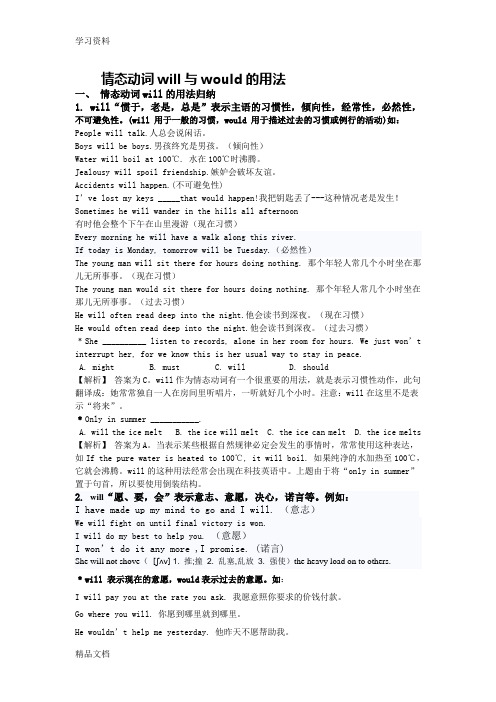
情态动词will与would的用法一、情态动词will的用法归纳1. will“惯于,老是,总是”表示主语的习惯性,倾向性,经常性,必然性,不可避免性。
(will 用于一般的习惯,would 用于描述过去的习惯或例行的活动)如:People will talk.人总会说闲话。
Boys will be boys.男孩终究是男孩。
(倾向性)Water will boil at 100℃. 水在100℃时沸腾。
Jealousy will spoil friendship.嫉妒会破坏友谊。
Accidents will happen.(不可避免性)I’ve lost my keys _____that would happen!我把钥匙丢了---这种情况老是发生!Sometimes he will wander in the hills all afternoon有时他会整个下午在山里漫游(现在习惯)Every morning he will have a walk along this river.If today is Monday, tomorrow will be Tuesday.(必然性)The young man will sit there for hours doing nothing. 那个年轻人常几个小时坐在那儿无所事事。
(现在习惯)The young man would sit there for hours doing nothing. 那个年轻人常几个小时坐在那儿无所事事。
(过去习惯)He will often read deep into the night.他会读书到深夜。
(现在习惯)He would often read deep into the night.他会读书到深夜。
(过去习惯)﹡Sh e __________ listen to records, alone in her room for hours. We just won’t interrupt her, for we know this is her usual way to stay in peace.A. mightB. mustC. willD. should【解析】答案为C。
英语will的用法(一)
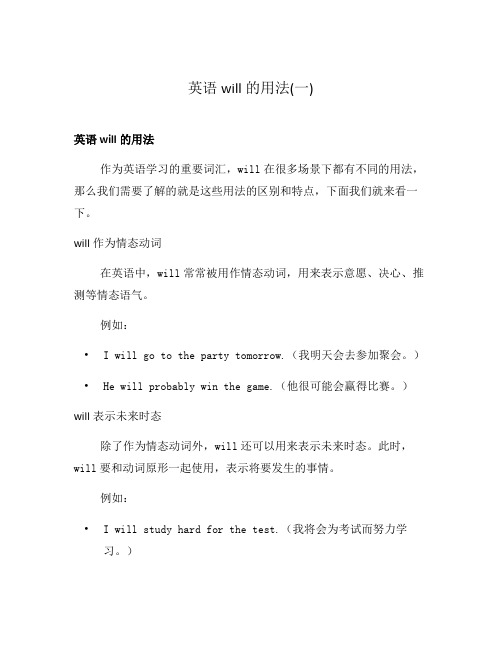
英语will的用法(一)英语will的用法作为英语学习的重要词汇,will在很多场景下都有不同的用法,那么我们需要了解的就是这些用法的区别和特点,下面我们就来看一下。
will作为情态动词在英语中,will常常被用作情态动词,用来表示意愿、决心、推测等情态语气。
例如:•I will go to the party tomorrow.(我明天会去参加聚会。
)•He will probably win the game.(他很可能会赢得比赛。
)will表示未来时态除了作为情态动词外,will还可以用来表示未来时态。
此时,will要和动词原形一起使用,表示将要发生的事情。
例如:•I will study hard for the test.(我将会为考试而努力学习。
)•They will travel to Beijing next month.(他们下个月将要去北京旅行。
)will的缩写与否在口语中,有些人会将will缩写成“’ll”,但是需要注意的是,这种缩写只在谈话中使用,如果是正式场合,需要使用完整的will。
例如:•I’ll bring you s ome food later.(我待会儿会给你送些食物。
)•I will sign the contract.(我会签署合同。
)will用于提供请求和帮助最后,will还可以用于提供请求和帮助,此时will往往是和would一起使用,表示一种礼貌的请求或帮助。
例如:•Will you please open the door for me?(你能否帮我打开门?)•Would you like some help with your luggage?(需要帮忙拿行李吗?)综上所述,will在英语中有着多种用法,我们需要根据具体的语境选择合适的用法,以避免出现语法错误和语义歧义。
will的用法小结为了更好地掌握will的用法,我们可以将其总结如下:1.will作为情态动词,表示想法、意愿、决心等情态语气。
高考英语情态动词复习:will和would
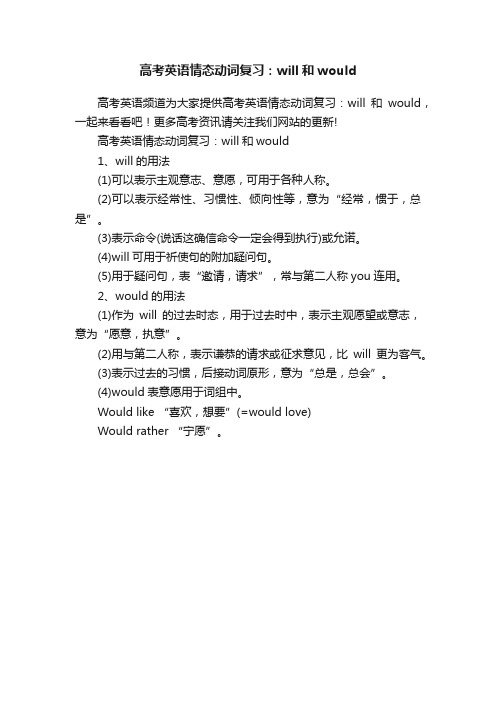
高考英语情态动词复习:will和would
高考英语频道为大家提供高考英语情态动词复习:will和would,一起来看看吧!更多高考资讯请关注我们网站的更新!
高考英语情态动词复习:will和would
1、will的用法
(1)可以表示主观意志、意愿,可用于各种人称。
(2)可以表示经常性、习惯性、倾向性等,意为“经常,惯于,总是”。
(3)表示命令(说话这确信命令一定会得到执行)或允诺。
(4)will可用于祈使句的附加疑问句。
(5)用于疑问句,表“邀请,请求”,常与第二人称you连用。
2、would的用法
(1)作为will的过去时态,用于过去时中,表示主观愿望或意志,意为“愿意,执意”。
(2)用与第二人称,表示谦恭的请求或征求意见,比will更为客气。
(3)表示过去的习惯,后接动词原形,意为“总是,总会”。
(4)would表意愿用于词组中。
Would like “喜欢,想要”(=would love)
Would rather “宁愿”。
- 1、下载文档前请自行甄别文档内容的完整性,平台不提供额外的编辑、内容补充、找答案等附加服务。
- 2、"仅部分预览"的文档,不可在线预览部分如存在完整性等问题,可反馈申请退款(可完整预览的文档不适用该条件!)。
- 3、如文档侵犯您的权益,请联系客服反馈,我们会尽快为您处理(人工客服工作时间:9:00-18:30)。
情态动词will与would的用法一、情态动词will的用法归纳1. will“惯于,老是,总是”表示主语的习惯性,倾向性,经常性,必然性,不可避免性。
(will 用于一般的习惯,would 用于描述过去的习惯或例行的活动)如:People will talk.人总会说闲话。
Boys will be boys.男孩终究是男孩。
(倾向性)Water will boil at 100℃. 水在100℃时沸腾。
Jealousy will spoil friendship.嫉妒会破坏友谊。
Accidents will happen.(不可避免性)I’ve lost my keys _____that would happen!我把钥匙丢了---这种情况老是发生!Sometimes he will wander in the hills all afternoon有时他会整个下午在山里漫游(现在习惯)Every morning he will have a walk along this river.If today is Monday, tomorrow will be Tuesday.(必然性)The young man will sit there for hours doing nothing. 那个年轻人常几个小时坐在那儿无所事事。
(现在习惯)The young man would sit there for hours doing nothing. 那个年轻人常几个小时坐在那儿无所事事。
(过去习惯)He will often read deep into the night.他会读书到深夜。
(现在习惯)He would often read deep into the night.他会读书到深夜。
(过去习惯)﹡Sh e __________ listen to records, alone in her room for hours. We just won’t interrupt her, for we know this is her usual way to stay in peace.A. mightB. mustC. willD. should【解析】答案为C。
will作为情态动词有一个很重要的用法,就是表示习惯性动作,此句翻译成:她常常独自一人在房间里听唱片,一听就好几个小时。
注意:will在这里不是表示“将来”。
﹡Only in summer ___________.A. will the ice meltB. the ice will meltC. the ice can meltD. the ice melts 【解析】答案为A。
当表示某些根据自然规律必定会发生的事情时,常常使用这种表达,如If the pure water is heated to 100℃, it will boil. 如果纯净的水加热至100℃,它就会沸腾。
will的这种用法经常会出现在科技英语中。
上题由于将“only in summer”置于句首,所以要使用倒装结构。
2. will“愿、要,会”表示意志、意愿,决心,诺言等。
例如:I have made up my mind to go and I will. (意志)We will fight on until final victory is won.I will do my best to help you.(意愿)I won’t do it any more ,I promise. (诺言)She will not shove([ʃʌv] 1. 推;撞2. 乱塞,乱放3. 强使)the heavy load on to others.﹡will 表示现在的意愿,would表示过去的意愿。
如:I will pay you at the rate you ask. 我愿意照你要求的价钱付款。
Go where you will. 你愿到哪里就到哪里。
He wouldn’t help me yesterday. 他昨天不愿帮助我。
She asked if I would go with them. 她问我是否愿同他们一起去。
﹡would也可表示现在的意愿,语气较委婉。
如:I’d go there with you. 我愿同你去那儿。
I wouldn’t go. 我不会去。
﹡—--These books are too heavy for me to carry.-----__________.(06辽宁卷)A. You may ask for help.B. I will give you a handC. I will do you a favor D I’d come to help【解析】答案为B。
will表示意愿,有“愿、要”之意。
give sb. a hand 意思是“帮某人的忙”。
“I will give you a hand.”翻译为:我愿意帮忙。
﹡--—Don’t forget to come to my birthday party tomorrow.--— ________.(94全国卷)A. I don’tB. I wo n’tC. I can’tD. I haven’t【解析】答案B。
will表示决心,此回答是省略句,补充完整是“I won’t forget to goto your birthday party tomorrow.”。
“I won’t.”翻译为:我决不会忘记的。
3. 表示说话人向对方提出请求或询问对方的意思,有“你…..好吗、你愿…..”。
(这时will与 would 通用,而would更委婉,也可以用won’t)Will you join in our discussion?Would you please tell me your telephone number?Won’t you sit down?Close the window, would you?请关上窗,好吗?﹡We forgot to bring our tickets, but please let us enter,_________ ?(06全国卷2) A. do you B. can you C. will you D. shall we【解析】答案为C。
题中but后面的句子“please let us enter, will you?”是以let us开头的祈使句,它加上will you构成反意疑问句,这里will you表示提出请求。
will在疑问句中用于第二人称时,表示说话人向对方提出请求或询问,有“你……好吗”之意。
此句翻译为:我们忘了带票,请你让我们进去,好吗?4. will表示说话人的猜测,意为“大概”。
如:That will be the book you want. 那大概是你所要的书。
Ask him. He will know. 问他吧,他大概知道。
﹡will用于谈论现在; would可用于谈论过去,也可用于谈论现在(语气较委婉)。
如:This car will hold six people. 这辆小汽车可以坐六个人。
Ask him. He will know. 问问他吧,他大概知道。
You wouldn’t know. 你不会知道。
Every family would have some sort of trouble. 家家都会有本难念的经。
The person you mentioned would be her father, is that right? 你提的那个人想必是她的父亲,对吗?【注】有时可后接完成式,表示对过去可能已经发生的情况进行推测。
如:You will have heard of it. 你已经听到那事了吧I thought you would have finished it by now. 我想你现在可能已经做完了吧。
﹡That, I think, _________ be all that I want to say.A. canB. couldC. willD. ought to【解析】答案为C。
will 也可以表示推测,通常可译为“想必”、“也许”、“大概”、“可能”,其确信程度仅次于must。
该句翻译为:我想大概那就是我想要说的一切。
5.表命令或指示No one will leave the examination room before 12 o’clock.任何人在12点之前都不许离开考场。
All boys will attend roll-call at 9 o’clock. 所有的男孩必须在9点钟参加点名。
(We'd better have a roll call now.我们最好现在点名。
)﹡will 还可表示许诺、指示、叮嘱等,而would还可用于评论某一特定的行为等。
如:You will have your share. 你会得到你那一份的。
You will do as I told you. 你得照我说的去做。
That’s just what he would say. 他就是爱那样讲话。
You would never do anything to hurt me. 你绝不会做伤害我的事的6. 表执意He will comb his hair at the table, even though he knows I don’t like it.他偏偏要在饭桌那儿梳头,还明明知道我腻味这事儿。
Jack will do these things!杰克总是爱干这样的事!﹡疑难解析1. will not 或won’t 表示不愿意或拒绝,我们知道,对于有生命体来说,will可表示意愿:She won’t open the door. 她拒不开门。
但是,对于无生命体,有时也使用will表示意愿。
语言学家们说will用于无生命体,如同refuse一样,是通过拟人化的手段来实现的。
例如:The car won’t start.(= The car refuses to start.)汽车发动不起来。
请看下面一道高考题:2. 在if 从句中有时为了表示意愿也可用will ,有“愿意”的意思。
例如:If you will read this article ,you will realize you are wrong.If you will help me, we can finish early.如果你愿意帮我,我们可以早点儿干完。
